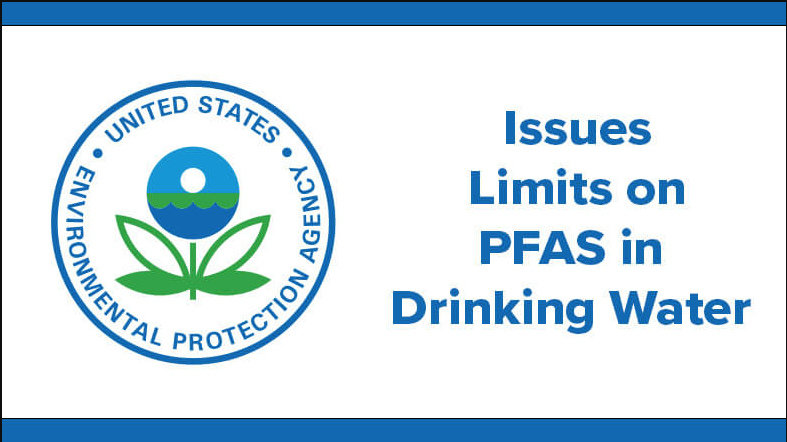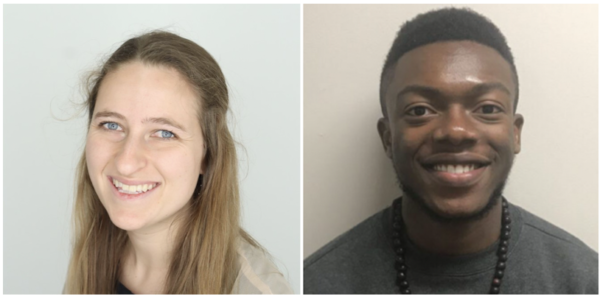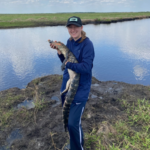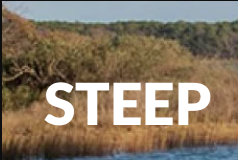July 2024 Newsletter
Center for Environmental and Health Effects of PFAS
NC State’s NIEHS-funded Superfund Research Program
The mission of this cross-disciplinary Center is to advance research, technology development, training and community engagement related to a class of ubiquitous environmental compounds known as per- and polyfluoroalkyl substances (PFAS). See Projects and Cores for details and long-term goals. (Sign up to receive our newsletters HERE).
Research, Translation, and Engagement Highlights

Jeff Yoder et al. develop advanced imaging methods to evaluate exposure-related effects on neutrophils
Center member, Jeff Yoder (Project 2) and collaborators developed a new approach that combines advanced imaging methods with machine learning to rapidly image and count neutrophils, a type of immune cell, in zebrafish embryos. Research suggests that exposure to environmental pollutants can decrease neutrophil levels, emphasizing the need for strategies to screen chemicals affecting neutrophil counts. This research provides new opportunities to explore the immunological effects of PFAS exposure. Jeff’s work was featured as an extramural paper of the month in the Environmental Factor.

CEC Hosts Summer Intern
This summer, we’re pleased to have Kiara Servin working with the Community Engagement Core (CEC) through the Science Communicators of North Carolina’s (SCONC) HBCU internship program. Students majoring in STEM Fields at North Carolina HBCUs are paired with professional science communicators across the Research Triangle Region for ten weeks, offering hands-on experiential learning. Kiara will be working on a variety of projects with the CEC, including creating materials for our PFAS Hub and managing our social media presence.

Strengthening Stakeholder Partnerships
Our Center members and Research Translation efforts continue to strengthen partnerships with local, state, and federal stakeholders including but not limited to NC Department of Environmental Quality, Department of Health and Human Services, and EPA’s Office of Water, to help improve education and regulation of PFAS.

NC State and Iowa SRP Centers Collaborate to Address NC State Community Concerns About PCBs
In Fall 2023, NC State reported PCB contamination in one of our academic buildings. In response to growing concerns from members of our campus community, we partnered with the University of Iowa SRP Center (Drs. Keri Hornbuckle and Hans-Joachim Lehmler), which focuses on PCBs, and Dr. Linda Birnbaum, to provide an open Q&A Session on the Science of PCBs. Carolyn Mattingly (NC State Center PI) and Katy May (CEC Director) moderated the session, which drew over 200 attendees from our campus community. A written follow-up was provided to the campus in which all questions were organized into topic areas with responses and links to additional information. We are incredibly grateful for the partnership with the Iowa SRP and experienced the actionable benefits of the broader SRP network as we continue to work through this challenging issue.
Publications Update
See HERE for a complete list of Center publications.
- Bline AP, DeWitt JC, Kwiatkowski CF, Pelch KE, Reade A, Varshavsky JR. (2024, March 13). Public Health Risks of PFAS‑Related Immunotoxicity Are Real. Curr Envir Health Rpt. Article.
- Chappel JR, Kirkwood-Donelson KI, Reif DM, Baker ES. (2024, April). From big data to big insights: statistical and bioinformatic approaches for exploring the lipidome. Anal Bioanal Chem. Article.
- Hopkins ZR, Knappe DRU (2024, March 19). Predicting per- and polyfluoroalkyl substances removal in pilot-scale granular activated carbon adsorbers from rapid small-scale column tests. AWWA Water Science. Article.
- Kirkwood-Donelson KI, Chappel JR, Dodds J, Reif DM, DeWitt JC, Baker ES, Tobin E. 2024. Investigating mouse hepatic lipidome dysregulation following exposure to emerging per- and polyfluoroalkyl substances (PFAS). Chemosphere. Article.
- Kotlarz N, Guillette T, Critchley C, Collier D, Lea CS, McCord J, Strynar M, Cuffney M, Hopkins ZR, Knappe DRU, Hoppin JA. (2024, January 10). Per- and polyfluoroalkyl ether acids in well water and blood serum from private well users residing by a fluorochemical facility near Fayetteville, North Carolina. J Expo Sci Environ Epidemiol. Article.
- Kotlarz N, McCord J, Wiecha N, Weed RA, Cuffney M, Enders JR, Strynar M, Knappe DRU, Reich BJ, Hoppin JA. (2024, February 2). Measurement of Hydro-EVE and 6:2 FTS in Blood from Wilmington, North Carolina, Residents. Environ Health Perspect. Article.
- Kotlarz N, McCord J, Wiecha N, Weed RA, Cuffney M, Enders JR, Strynar M, Knappe DRU, Reich BJ, Hoppin JA. (2024, February 2). Reanalysis of PFO5DoA Levels in Blood from Wilmington, North Carolina, Residents, 2017-2018. Environ Health Perspect. Article.
- Phelps DW, Connors, Ashley M, Ferrero G, DeWitt JC, Yoder JA. (2024, May 7). Per- and polyfluoroalkyl substances alter innate immune function: evidence and data gaps. J Immunotoxicology. Article.
- Starnes HM, Jackson TW, Rock KD, Belcher SM. (2024, March 22). Quantitative cross-species comparison of serum albumin binding of per- and polyfluoroalkyl substances from five structural classes. Tox Sci. Article.
- Weed RA, Campbell G, Brown L., May K, Sargent D, Sutton E, Burdette K, Rider W, Baker ES and Enders JR. Non-Targeted PFAS Suspect Screening and Quantification of Drinking Water Samples Collected through Community Engaged Research in North Carolina’s Cape Fear River Basin. Toxics. Article.
Trainee Highlights

Trainees, Hannah Starnes and Nnamdi Osakwe, Graduate!
This spring, two Center trainees successfully completed their PhD programs working on SRP projects. Dr. Starnes’ project was, A New In Vitro and Machine Learning Framework for Characterizing Albumin Binding Across the Per- and Polyfluoroalkyl Substance Chemical Landscape in association with Project 3 (mentored by Scott Belcher). Dr. Osakwe’s project was, Using Machine Learning to Build An Integrated Framework for Modeling Environmental Health: The Environmental Integrity Framework in association with the DMAC (mentored by David Reif, now at NIEHS).

Trainee, Hannah Starnes, Wins SOT Outstanding Graduate Student Leadership Award
Trainee, Hannah Starnes (mentored by Scott Belcher, Project 3), won the Outstanding Graduate Student Leadership Award from the Graduate Student Leadership Committee at the Society of Toxicology (SOT) Meeting in March 2024. She was one of three recipients of the award this year.

NC State/STEEP Trainee Journal Club
Our trainees continue to meet virtually with trainees from the STEEP Center to present on their research, discuss research strategies, and share insights. Thank you, Angela Slitt, for continuing to co-organize these valuable events!
In the News

The Cost of Freeing Drinking Water from ‘Forever Chemicals’
According to Detlef Knappe (Dep. Director and Project 4), achieving a level of zero PFAS in water is unmeasurable and, therefore, unenforceable. Still, in a recent interview about improving water quality, Jamie DeWitt (Project 2) emphasized the importance of continuing to lower PFAS levels. Given that the only completely risk-free level of “these compounds that were not really ever designed to go into human bodies” is zero, Jamie believes that lowering PFAS levels in water, even by a few parts-per-trillion and even if we can’t get to zero, is still an important use of resources. See HERE to read more.

PFAS in Air and Tap Water
Detlef Knappe (Dep. Director and Project 4) was in the news this spring, weighing in on PFAS air and water contamination. Tests of home tap water were taken from several cities in central North Carolina and revealed that several cities had higher than the proposed EPA limit of PFAS in their water supplies. PFAS air emissions may contribute significantly to widespread PFAS contamination of the water and food supplies. See HERE to read more.

The GenX Exposure Study Transitions to a Health Study
Jane Hoppin (Project 1) explains how the GenX Exposure Study has transitioned to one that will allow researchers to examine potential long-term health effects in hundreds of North Carolinians who, for years, unknowingly drank water containing PFAS. The GenX Exposure Study measures PFAS, cholesterol, thyroid and metabolic panels in more than 1,000 residents from several regions along the Cape Fear River in North Carolina. See HERE to read more.
Events

CEC uses Center Datasets to Engage K12 Teachers
The CEC has been working with Project 2 and Project 4 to provide data for ongoing workshops with K12 teachers. In partnership with NC State’s Science House, Data Science Academy, and our NIEHS-funded P30 Center, the CEC hosted workshops in March, June, and July introducing teachers to data science techniques using real datasets from our ongoing PFAS research. Teachers are using Center datasets to create lessons and classroom activities that are engaging, locally relevant, and aligned with state science standards. Biology and math teachers have been especially excited about data from Project 2 using zebrafish to understand immune responses to PFAS. Environmental Science and Physical Science teachers are using surface water measurements from Project 4 to build a local case study for their hydrology and water pollution units. CEC Director, Katy May, presented this work at the annual Partnerships for Environmental Public Health meeting and the National PFAS Conference in collaboration with Dana Haine (UNC-Chapel Hill) and Laurel Schaider (U of Rhode Island SRP Center).

4th Annual PFAS Meeting
Center members participated in the planning and hosting of the 4th National PFAS Conference held in Ann Arbor, MI (June 10-12, 2024). This unique and powerful meeting convened scientists, physicians, regulatory agencies, journalists, and community members to discuss the complex issues surrounding PFAS exposure, science, and remediation. Check the website for recordings of presentations.

Data Science and Environmental Health Science Research Symposium
NC State’s SRP Center helped to sponsor, plan, and host a symposium, Data Science and Environmental Health Science Research Symposium (April 5). This symposium provided expert knowledge on state-of-the-art approaches in data science as applied to environmental health research. An overview of the Symposium was reported in the May issue of the Environmental Factor.
